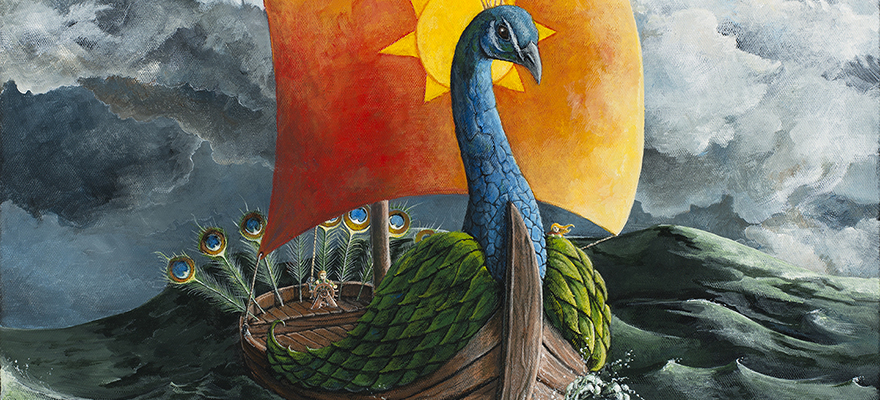Here, from Ella West (age 11) is one of the many, many delightful stories we received in response to Jamin Still‘s Illustrative Writing Prompt. Enjoy!
In the far-off city of Sol-et-Pavus, all the houses had golden suns painted on their doors, and proudly preening peacocks roamed the streets. The suns represented the king of the city, and the peacocks symbolized the people of Sol-et-Pavus, who had quite as discordant voices as the fowl, but who were rather stunning creatures to look at. Of all the population, Leslie alone had a melodious voice. She and her twin brother Roland lived alone in a small cottage by the beach.
Usually, the city streets were crowded with people visiting friends or heading to the shore. Today the streets of Sol-et-Pavus were empty of all but the peacocks because the city had received word that their arch enemies were about to attack. All the women and children were ordered to sail to other islands in the kingdom’s fleet of ships, which were shaped like peacocks with suns on their orange sails. Amid the chaos and confusion, Leslie and Roland hastily boarded a ship along with other children. Roland, who was the most seaworthy, was at the wheel, and Leslie stood by him. She remarked sorrowfully, “I wish we didn’t have to leave our lovely Sol-et-Pavus.”
“Yes,” agreed Roland, “but — perhaps this very moment — it is being destroyed.”
“All those poor peacocks must be in terrible danger,” Leslie added.
“Poor peacocks? Good riddance! Why, what about all the times they trampled our garden? And what about their squawky voices on an otherwise peaceful night? And their clogging the path whenever one was in a hurry?” objected Roland.
“Maybe you’re right. They are so beautiful, though. I’m going to watch for land.”
Soon Leslie stood at the prow, gazing at the massive, foaming waves, singing songs of great grief.
Suddenly Roland, glancing backwards, spotted an enemy ship sailing towards them. He called to the children to climb below deck, but Leslie, lost in her song and the powerful noise of the water, did not hear. He could not leave the wheel or the ship would crash on the rocks. He called, “Leslie!” but she was deaf to his cries.
The enemy ship came alongside the proud peacock’s head. Cruel ropes snagged Leslie from the prow and, with her golden hair flowing in the wind, she fell into the enemies’ hands. They failed to notice Roland, who was in the back of the ship hidden by the wheel, and sailed swiftly away, soon lost to sight. Roland knew what these barbarous diabolical people did with prisoners: they tied them to protruding rocks and left them to drown when the tide turned. He must save Leslie, but he did not know where she was.
The ship cut through the water as swiftly as a dolphin. He searched the seas, racing against time. As he hunted, Roland heard the sound of a beautiful voice singing a heart-broken song with no threads of hope to assuage its grief.
As it floated on the wind he recognized the voice as Leslie’s. He turned the ship towards the voice and eventually saw her, a white speck on a black rock. When he could see her plainly he anchored the ship, lowered the boat, and rowed towards her. As he glanced behind he saw that the water was up to her shoulders but still she sang, her face turned away from him. The water crept up her chin — her lips — her voice was cut off.
Roland, who had a voice as squawky as a peacock, sang the next verse. She turned to him in disbelief as the water climbed up her cheekbones. He reached her, seemingly with agonizing slowness, just as her golden head slipped beneath the waves. He pulled Leslie, barely alive, into the boat and rowed back to the ship.
The other children helped him raise the boat, crying out that a messenger dolphin had brought the news that Sol-et-Pavus had been saved and they could return. Roland was jubilant, but he remained steadfastly attentive to his sister. As the ship turned homewards he laid her on a bunk and tended her through the night. In the deepest, darkest hours his heart filled with despair and he turned aside from Leslie’s white form, weeping.
While he wept it seemed to him that he was steering the ship again, as Leslie’s voice filled the air with exquisite music. With a shake of his head, he cleared his mind of these delusions, and turned his gaze on his dear sister whom he thought he had saved for naught–and she was singing.
- Andy Johnson and the March for Justice, by Esau McCaulley - February 12, 2025
- Little Christmas Carol - November 20, 2024
- Kathryn Butler Kicks off Withywindle season 7 - May 29, 2024

I especially loved the vivid word usage and beautiful phrasing in this one! I am glad those barbarous diabolical people who tie children to the protruding rocks were thwarted by an exquisite, heart-broken song!